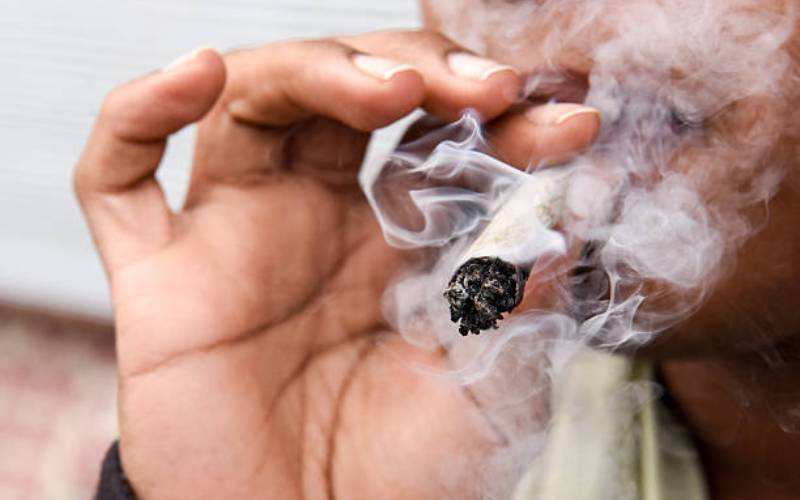
Ignorance and misinformation threaten to rob Kenyan smokers of their best chance to quit their deadly habit. In a country where the Ministry of Health says about 8,100 die each year from tobacco-related diseases, we must explore all available avenues to help smokers beat their addiction.
Despite continuous public awareness campaigns, alongside strict regulations banning tobacco advertising and smoking in public places, an estimated one in every 10 adult Kenyans continue to smoke cigarettes.
It's a stark truth that smoking is an addictive and not easy to quit habit but we should diligently advocate for evidence-based methods that might help smokers quit. Unfortunately, in Kenya, that is not happening.
International evidence such as Cochrane Review and Swedish studies show that the most successful methods of quitting smoking involve modern alternative nicotine products such as regulated vapes (e-cigarettes), varenicline and cytisine and other modern nicotine products such as Nicotine Replacement Therapies as well as modern oral nicotine products such as oral nicotine pouches.
These innovative products are significantly less harmful than traditional combustible cigarettes. They don't contain tobacco, nor do they involve burning, the primary cause of smoking-related illnesses.
As per World Health Organisation's Framework Convention on Tobacco Control (WHO FCTC) Article 1 (d) "tobacco control" is defined as a range of supply, demand and harm reduction strategies that aim to improve the health of a population by eliminating or reducing their consumption of tobacco products and exposure to tobacco smoke.
Countries such as Sweden and the UK have embraced harm reduction and a risk-related approach to regulating these products, which has led to a reduction in smoking rates, saving thousands of lives and reducing the public health burden of smoking.
In Kenya, however, this compelling evidence appears to be ignored. Some campaign for these less harmful products to be treated just like combustible cigarettes.
- Government suspends tobacco licences in crackdown on youth nicotine use
- High Court halts health ministry's nicotine ban directive
- Health Ministry under fire after partnering with BAT in health campaign
- WHO maintains mpox alert amid West Africa surge
Keep Reading
This unscientific non-evidence-based approach to tobacco control is also under discussion in our Parliament but this unfounded approach threatens to hinder the much-needed help by smokers.
As medical professionals, we urge legislators to consider the weight of science supporting tobacco harm reduction as well as tighten regulation and enforcement of these products to protect our unborn children, young children and youth.
A study we conducted recently while at the University of Nairobi's Faculty of Health Sciences found that Kenyans choose harmful traditional smokeless tobacco products over less harmful products and are at risk of developing cancer and other tobacco-related illnesses just as much as the smokers of combustible tobacco. The research calls for regulation of smokeless tobacco products.
Treating these nicotine products, the same way as tobacco not only confuses smokers but also discourages them from making the switch to reduced-risk alternatives.
Meanwhile, the greatest testament to the success of tobacco harm reduction is Sweden, where in the past 15 years, they have managed to reduce their smoking rate from 15 per cent to 5.6 per cent.
In the next few months, that rate is poised to fall below five per cent, the level at which a country is officially classified as 'smoke-free' by the World Health Organisation (WHO).
Sweden's success is largely attributed to making alternative nicotine products accessible, acceptable and affordable for adult smokers. Today, they boast Europe's lowest incidence of smoking-related diseases and the fewest premature deaths related to tobacco.
Lung cancer fatalities are less than half the European Union (EU) average, and overall cancer deaths are 38 per cent lower.
These remarkable statistics underscore the substantial beneficial impact of reduced-risk alternative nicotine products on public health and individual well-being in the context of harm reduction.
Sweden's story should serve as an eye-opener, prompting greater understanding and recognition of the immensely beneficial impact of tobacco harm reduction.
Smokers of combustible cigarettes should be allowed to make informed choices on the use of these reduced-risk alternative nicotine products, and extreme regulation should be in force to protect unborn babies, children and youth.
The most comprehensive study to date investigating whether e-cigarettes are a gateway into or out of smoking finds that, at the population level, there is no proof that e-cigarettes and other alternative nicotine delivery products promote smoking.
Kenyan legislators and public health authorities must take a closer look at the countries that have successfully reduced smoking rates and improved public health by embracing tobacco harm-reduction strategies.
It's time for our country to follow suit by adopting an approach that prioritises harm reduction, allows smokers a more viable path to quitting, saves lives and more importantly establishes a Stop Smoking Services Department under the Ministry of Health to directly help smokers quit through evidence-based approaches in tobacco harm reduction.
We cannot afford to let ignorance and misinformation rob our fellow Kenyans of their best chance to break free from the deadly grip of smoking. It's time for change, and it's time to give our citizens a chance for a healthier and smoke-free future.
Dr. Kariuki is a medical doctor, public health specialist and Secretary Harm Reduction Society Kenya. [email protected]
 The Standard Group Plc is a multi-media organization with investments in media
platforms spanning newspaper print
operations, television, radio broadcasting, digital and online services. The
Standard Group is recognized as a
leading multi-media house in Kenya with a key influence in matters of national
and international interest.
The Standard Group Plc is a multi-media organization with investments in media
platforms spanning newspaper print
operations, television, radio broadcasting, digital and online services. The
Standard Group is recognized as a
leading multi-media house in Kenya with a key influence in matters of national
and international interest.




